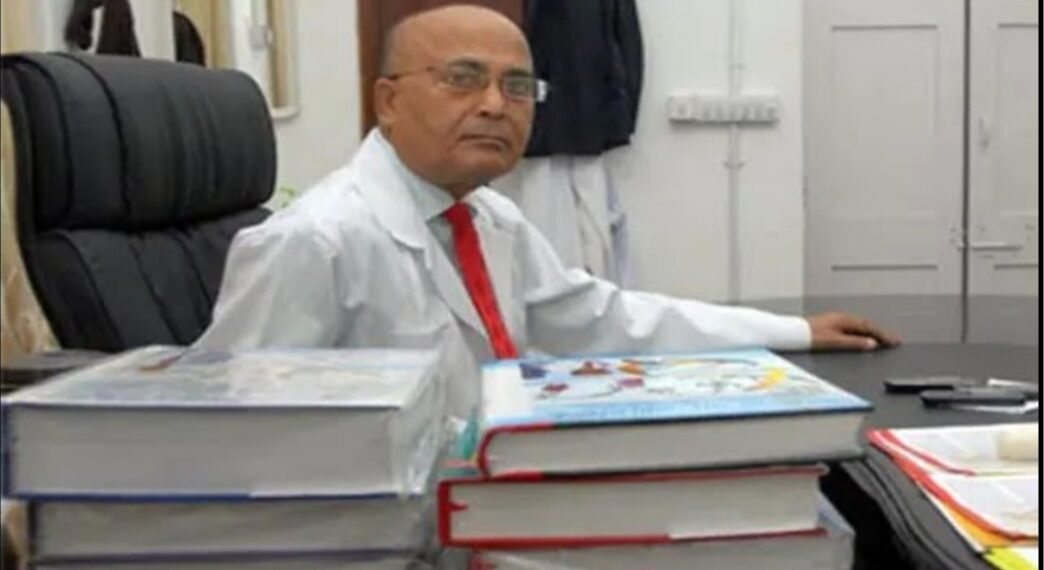GUWAHATI: Internationally acclaimed heart surgeon Dr. Dhaniram Baruah has claimed to have developed new techniques of treatment called the Baruah Applied Human Genetic Engineering.
Dr. Baruah, who is known for his pioneering research in xeno-transplantation, has isolated bio-molecules from edible medicinal plants from northeast India.
“These molecules are called Baruah Small Interfering RNAs (Baruah siRNAs), which targets mutated (impaired) micro RNAs (miRNA) responsible for various disease,” Dr. S. A. Achrekar, Chief Scientist of Dr. Dhaniram Baruah Heart Research Institute, said.
The bio- molecules when injected into the patients system, a number of combat genes are produced, which specifically targets diseased genes of the patient, Dr. Achrekar, said.
“We have treated number of patients suffering from Coronary Artery Disease (CAD), Congenital Heart Disease, diabetes, hypertension, Cancer, Lupus, arthritis, HIV/AIDS, kidney disorder and many more diseases,” she said.
Addressing a press conference on Tuesday in Guwahati, Dr. Achrekar said till now there has been no cure for HIV/AIDS.
“Anti-Retroviral therapy is lifelong therapy, hiding virus as proviral DNA make virus non-detectable, but it does not cure the HIV/AIDS at all,” she said.
On the contrary, Dr. Dhaniram Baruah’s treatment removes the hidden virus from “pro-viral DNA” and destroys it. And subsequently the combat genes repair immunologically impaired genes to take the charge of immune system of the patient’s body.
“It becomes barrier for the new entry of the virus in the human body, and makes the patient HIV/AIDS free,” Dr. Achrekar said.
Dr. Dhaniram Baruah has been doing pioneering research in xeno-transplantation, and is known for his research works.
In January 1997, Dr. Dhani Ram Baruah, along with Hong Kong-based cardiac surgeon Dr Jonathan Ho, had implanted a pig heart on 32-year-old patient Purno Saikia.
The patient, Purno Saikia, had a ventricular septal defect, and had survived for seven days after the pig heart transplant.
Unfortunately, the patient had developed hyper-acute rejection, and died.
The incident of the death of the patient had stirred a major controversy. Dr. Dhaniram Baruah and Dr. Jonatha Ho were arrested on January 10, 1997, under the Transplantation of Human Organs Act, 1994.
Interestingly, Dr. Baruah was arrested under the Transplantation of Human Organs Act, 1994 several months before its adoption by the Assam government. He is in Guwahati Central Jail for 40 days.
Dr. Baruah had claimed that the implant of pig heart cannot come under the purview of Transplantation of Human Organs Act, 1994 as it was ‘xeno-transplantation (animal to human)’.
The then Assam government had instituted an inquiry into the case, and had claimed that the pig heart implant procedure was ‘unethical’.
Dr. Dhaniram Baruah, the founder of the first artificial heart valve, ‘Baruah21’, was not shattered even after his arrest. He continued with his research in his secluded heart institute at the outskirts of Guwahati.
Now, Dr. Baruah’s research on Applied Human Genetic Engineering has proved that it can easily ‘bypass’ the bypass surgeries.
“With Baruah’s Genetic Engineering, patients with Coronary Artery Disease need to go for bypass surgery, which is the mismatch surgical procedure,” Dr. Achrekar, said.
Baruah molecules remove the blockage, reduce the lipid levels and improve the fluidity of the blood with improved ejection function of the heart, she said, adding that it improves the cardiac output of the system.
In congenital heart disease, Baruah molecules rectify the physiological functions of the heart.
Dr. Achrekar presented two heart patients, one HIV patient and one cancer patient before the media, who narrated their medical history, and reconfirmed that they are fully cured now, and thanked Dr. Dhaniram Baruah for saving their lives.
Interestingly, Baruah’s anti-cancerous molecule does not allow the spread of cancer (metastasis), kills cancer cells specifically without harming normal cells. It cuts off blood supply to cancer cells, thereby, stopping nutrient supply, thus kill the cancer cells.















